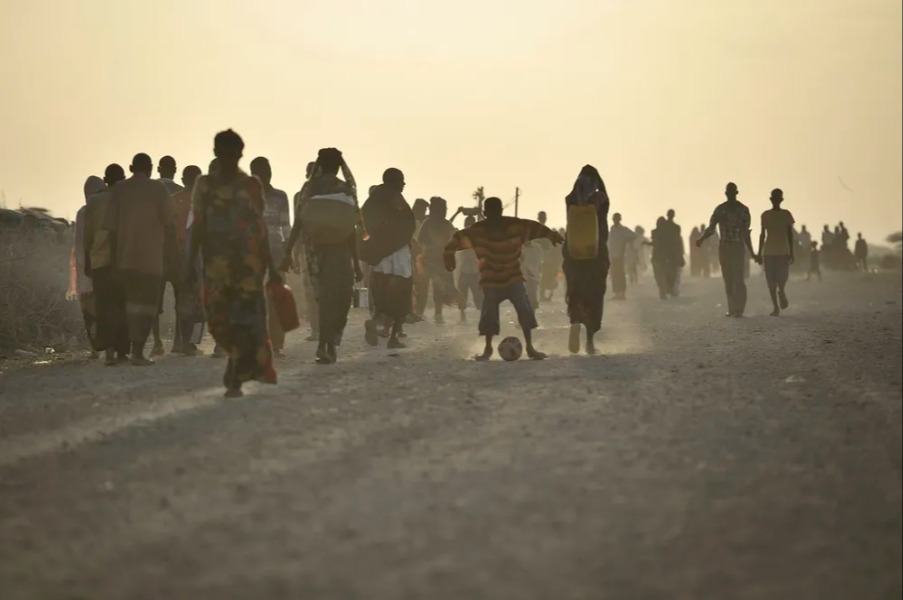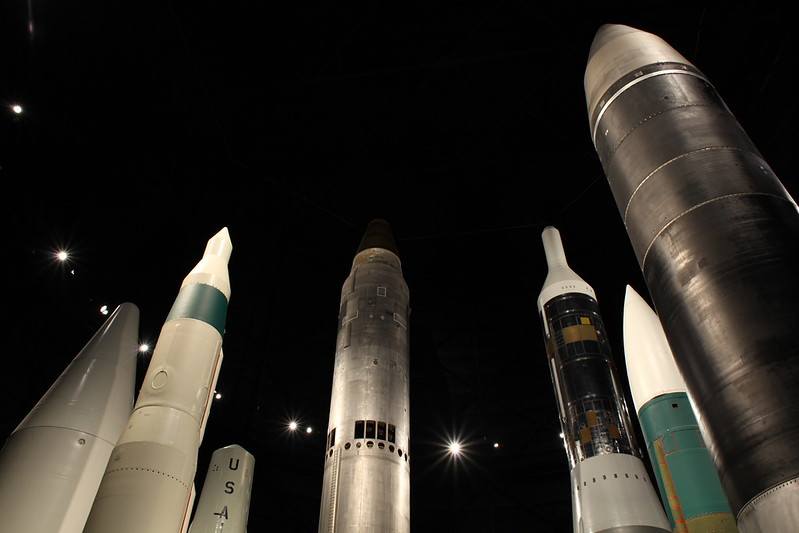The Sudan War and the Limits of American Power
There is very little, if anything, the U.S. can do to end the war in Sudan.

There is little coverage of the world’s worst humanitarian crisis and one of its most intractable conflicts: the almost two-year-old civil war in Sudan stemming from a power struggle between the Sudanese Armed Forces (SAF) and the paramilitary Rapid Support Forces (RSF).
Some reasons for the lack of coverage are understandable. For one thing, even before the war began, it was difficult to access Sudan, outside the now-ravaged capital of Khartoum; today it’s virtually impossible. But other reasons are much less so, such as a widespread ignorance and apathy toward Africa in the West, even among the educated classes. Africa has been near the bottom of U.S. foreign policy priorities across multiple administrations, including for President Biden, who visited the continent only in the last months of his presidency.
What little coverage the war receives usually bemoans this lack of interest, while arguing there is more the U.S. could be doing. There is a cottage industry of criticism of U.S. policy toward Sudan, stocked with analysts claiming to have better solutions for ending the war. As a collective, their prescriptions are contradictory and unrealistic. The U.S. should get more involved, they say, but also empower African nations to address their own crises. The U.S. should come down harder on the bad actors, but sanctions are essentially toothless. The U.S. should stop the genocide and the suffering, but boots on the ground are a nonstarter. The U.S. should focus on building the capacity of civilians, who have already received millions of aid dollars with little to show for it. The U.S. should counter the influence of external actors, who have chosen a side militarily, but without Washington choosing a side, which would be immoral, given the depravity of everyone involved.
After almost 20 years covering Africa at the CIA, I have no intention of joining the armchair quarterbacks, although doing so seems to be good job security. At the risk of never writing another foreign policy op-ed again, here’s the truth as I see it: There is very little, if anything, the U.S. can do to end the war in Sudan. The belligerents show little desire to stop fighting, and compelling them to do so would probably require a heavy-handed approach that is neither practical nor appropriate in the context of post-Cold War foreign policy.
This is not to say it isn’t worth attempting to alleviate suffering in Sudan and to position support for a time when the two sides are more amenable to peace. Nor is it to say that the U.S. should disengage with Africa in general, as the Trump administration is likely to do, based on the precedent of Trump’s first term. That era was defined mostly by benign neglect of the region, apart from some positive continuation of U.S. support for economic development and democratic progress, punctuated with more haphazard dips into the pool when some shiny object caught the president’s eye. (Examples include misinformation about white farmers being killed in South Africa; Christians being killed in Nigeria; and the dispute over the Grand Ethiopian Renaissance Dam). But I have little hope that Trump will pay much mind to Sudan, unless he can be wooed with mentions of RSF Commander Mohamed Hamdan Dagalo (a.k.a. Hemedti)’s mountains of gold. He does love gold.
Let’s start by reviewing what the U.S. has already done in Sudan since the fall of the Omar al-Bashir regime in 2019. At the time, the U.S. and other donors, such as the U.K., European Union, and United Nations, provided financial and technical support for standing up the transitional government and its implementation of a road map to a civilian government; the successful negotiation of the Juba Peace Agreement (JPA), between Khartoum and multiple rebel groups; the tortuous implementation of the JPA; and the organization and capacity building of the fractious, inexperienced civilian space. In 2020, the U.S. also lifted Bashir-era sanctions on the transitional government to enable broader support. When the transitional government broke down via a military takeover in 2021, the U.S. led efforts to negotiate a new Framework Political Agreement in December 2022 and funded workshops to begin to work through areas of foundational conflict between various sides.
Despite this heavy engagement, the intractable, and unavoidable, issue of security force integration and reform eventually spawned open conflict between the RSF and the SAF, which had shared power uncomfortably since 2019. Hemedti, who probably had no intention of subsuming his forces under the SAF, bided his time and maneuvered to enhance his political power, but he eventually opted to use force. Since the war began with a likely RSF attack on SAF positions in April 2023, the Biden administration has relentlessly—albeit too frenetically—tried to negotiate a ceasefire and humanitarian aid access; there has been modest success on the latter front. Most recently, the U.S. labeled the actions of the RSF in Darfur as genocide, a largely symbolic designation that nonetheless required a rigorous policy process. And finally, the U.S. has sanctioned multiple enterprises and individuals on both sides, including RSF Commander Hemedti and SAF Gen. Abdel Fattah al-Burhan.
The one thing the U.S. hasn’t done that could make a difference is lean harder on its ally-from-a-different-context, the United Arab Emirates (UAE). While there are multiple external actors making a mess in Sudan, the UAE’s military and economic support for the RSF is meaningfully fueling and prolonging the conflict. The U.S. did up the ante in early January by including seven Emirati-based companies in the latest round of sanctions. But more could be done to put diplomatic and economic pressure on the UAE, but that seems unlikely given Washington’s reliance on the Emiratis to help counter Iran in the Middle East. And, in the Trump era, the extra close friendship, burnished by possible, opaque business ties, between the Trump family and the Emiratis will probably preclude playing any hardball.
The nature of the conflict, and the dynamics between the warring groups, also complicates options for intervention. Hemedti and Burhan see the conflict as a zero-sum game in a country whose entire history has been just that, and they will probably fight until one of them wins or the state is effectively partitioned. A partition would be another chapter, and probably not the final one, in the slow-motion unraveling of this massive, under- and unevenly developed, arbitrarily rendered colonial construction with very little internal logic or cohesion.
Sudan’s gradual disintegration is a process into which the U.S. has more significantly inserted itself in the past. Largely due to pressure from a motley crew of white evangelicals, Black civil rights leaders, and miscellaneous do-gooders, the U.S. was a major force behind the end of the decades-long north-south Sudanese war and the formally recognized secession of South Sudan in 2011. That well-intentioned endeavor resulted in two failed Sudanese states instead of one. The U.S.-supported UN peacekeeping force that entered Sudan in 2007 was more effective in ending the first Darfur genocide. But when the peacekeeping mission ended and the forces left the country in January 2021, violence in Darfur returned with a vengeance.
The history of U.S. foreign policy in Africa would also point toward humility and recognizing the limits of American influence. During the Cold War, U.S.-backed anti-communist interventions and other meddling in African countries empowered brutal dictators and widespread corruption, for example, the Mobutu regime in what was then called Zaire, the Moi regime in Kenya, and the apartheid regime in South Africa. After the Cold War, U.S. priorities in the region shifted to democratic government, economic development, and counterterrorism.
But as non-democratic forces and governments, like China and Russia, have rushed into Africa with more money and fewer moral compunctions, the U.S. has struggled to keep up. The U.S. has rightly been reluctant to back corrupt and/or oppressive regimes, even in the face of such geopolitical competition. When you don’t choose a side, as the U.S. has appropriately refused to do in Sudan, it does limit your impact. But it also better upholds your values, which may matter more in the long run.
The decline of U.S. influence in Africa over the past 20 years is seen as a tremendous policy failure. No doubt there’s more the U.S. could do in Africa, especially through focused aid and infrastructure programs that pack a huge punch, such as PEPFAR, which prevented economic and demographic catastrophe, and, most recently, the Lobito Corridor, which promises to greatly facilitate trade and commerce with Central Africa.
But I would suggest that to the degree that the decline of U.S. influence has resulted from prioritizing American values and refusing to compromise with evil, it’s not a failure. In Sudan, the U.S. could no doubt end the war, at least in the short term, by choosing a side and going all in, as happened 20 years ago when the U.S. was the driving force behind the creation of South Sudan. But at what moral cost? The U.S. would almost certainly collect more Mobutus and Mois and Kiirs for its tarnished trophy case.
Critics of American policy in Africa seem to want it both ways. They want the U.S. to take a strong but noncolonial hand. They want it to rescue the continent without acting like a superhero. They want U.S. aid devoid of moral dictates, but not when it empowers the abusive. The Sudan war will end when the belligerents see a self-interest in stopping it. The U.S. can work to get them to see that, to incentivize it, but ultimately it’s going to be their call. Sudan will have to save itself.
That’s not to say the U.S. shouldn’t try to help. The U.S. should actually try harder and care more. Africa’s tragedies should get far more attention simply because our shared humanity demands it. Because there are no silver bullets, in Africa or in foreign policy more generally, despite what the chattering class will tell you.




